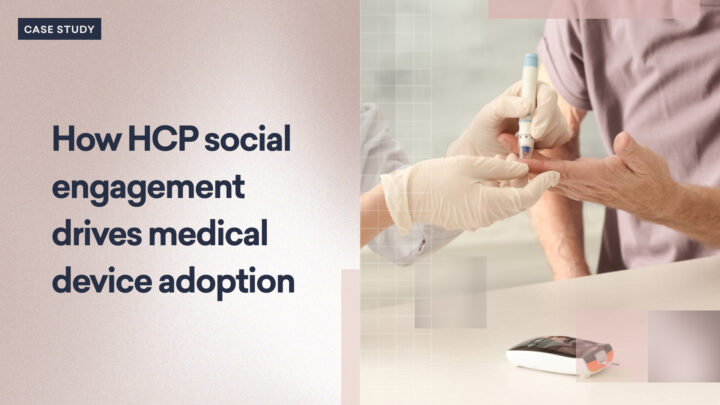
In the rapidly evolving world of healthcare communications, hyper-targeted, data-driven approaches are the new standard for reaching HCPs. This transformation demands increasingly granular data to understand how HCPs engage with both advertising and other forms of content. To meet this demand, pharmaceutical and medical device companies are turning to sophisticated machine-learning models that can fine-tune message targeting and control the frequency of exposure.
The goal is clear: to follow HCPs across the digital landscape and serve them the most relevant messaging at the most impactful moments.
The shift to hyper-targeted messaging
As the industry pivots towards more precise messaging strategies, the need for detailed insights into HCP behavior is paramount. Pharmaceutical and medical device companies are leveraging advanced machine learning algorithms to analyze and predict the most effective touchpoints for their messages. These models help in understanding not just where and when to deliver content, but also how often, ensuring that messages are seen without overwhelming the audience.
In Europe, this shift is particularly pronounced. Clients are keen on designing data-driven campaigns that can meticulously build and reach targeted audiences. They are not just interested in broad demographics but want to know exactly who they are reaching. This level of specificity, however, is challenged by stringent privacy regulations like GDPR. These regulations restrict the sharing of granular data containing personally identifiable information (PII), complicating efforts to verify the accuracy of audience targeting. The solve: leverage platforms with strong first-party data assets to enable you to compliantly and efficiently use sophisticated data models for targeting and campaign optimization.
Navigating privacy regulations
Privacy laws such as GDPR have made it increasingly complex for publishers to share detailed HCP data without compromising PII. This has led to a pressing need for innovative solutions that can confirm accurate audience targeting while respecting privacy constraints. Pharmaceutical and medical device companies are exploring various methods to achieve this balance, ensuring their campaigns are “moving the needle” while adhering to regulations.
Sermo’s unique position
Amidst these challenges, HCP-only social platform like Sermo offer a distinct advantage: all our data is first-party data, fueled by our opted-in 1.5 million strong physician and provider community. Unlike many publishers who rely on third-party cookies to track HCP activities, Sermo’s platform is built on direct data collection. This not only enhances the accuracy of our insights but also ensures compliance with privacy regulations.
Our platform’s dual nature as both a social and market research hub allows us to combine primary and secondary data, providing a holistic view of HCP engagement. We can track what content HCPs interact with, how they respond to ads and the overall impact and perception of those ads. This comprehensive approach enables us to deliver hyper-targeted, data-driven messaging that resonates deeply with HCPs.
Leveraging first-party data
The use of first-party data sets Sermo apart in several key ways:
- Accuracy and Relevance: By collecting triple-verified data directly from our members, we ensure that the information is precise and up-to-date.
- Privacy Compliance: Our approach is inherently compliant with GDPR and other privacy regulations.
- Comprehensive Insights: By integrating social interactions with market research data, we provide a full-spectrum view of HCP behaviors and preferences.
See HCP data in action: success story
Sermo set out to drive awareness of an Eosinophilic Asthma treatment among target writers and non-writers by executing an engagement-triggered campaign consisting of 3 waves, each one with 6 creatives served to specific physicians.
Every week over five months, Sermo reviewed who interacted with the Primary Creative to determine who was served the Secondary “Triggered” Creative.
Results proved how leveraging first- and zero-party data improves physician likelihood to prescribe and recommend brands to peers. Physicians who were exposed to the campaign showed higher rates of likelihood to discuss with sales reps, conduct research, prescribe and recommend treatment.
In the pursuit of hyper-targeted, data-driven HCP engagement, leveraging first-party data and sophisticated machine learning models is essential. As privacy regulations continue to tighten, the ability to deliver relevant, impactful messaging while respecting user privacy will be a key differentiator. Sermo’s unique platform and data capabilities position us at the forefront of this transformation, helping the medical industry navigate these complexities with confidence and precision.
As the industry continues to evolve, staying ahead means not just adapting to change but creating it. By harnessing the power of HCP first-party data innovations, we can ensure that our communications are more effective, our strategies more informed, and our impact on HCPs more profound than ever before.
On behalf of Sermo, thank you for checking out our blog post on HCP Data Innovations. This is just one of the many success stories on how to leverage Sermo’s first-party data assets to fuel more meaningful HCP engagement and education campaigns.
At Sermo, access a global community of healthcare professionals and experts to fuel your strategic business decisions. Engaging with more than 1.5 million HCPs across 150 countries, we provide physicians and advanced-practice providers with a social platform that fosters impactful peer-to-peer collaboration & discussions about issues that are important to them and their patients. Sermo offers on-demand access to HCPs, payers, experts and Opinion Leaders via a suite of proprietary technology to provide business intelligence that benefits pharmaceutical, healthcare partners and the medical community at large.














